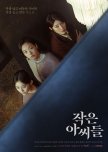
The premise of the story, that these three sisters deal with their entanglement with this sordid business, is set up well. Each of the secondary characters has some role with the Jeongran Society, and the writing kept me interested in guessing who is doing exactly what (i.e., who is the Big Villain). But the two main characters, In Joo and In Kyung, are frustrating to watch. In Joo has gotten herself into an obviously perilous situation, which she apparently doesn't bother to discuss with her sisters, even though (among other things) she may be putting her family in danger. In Kyung is similarly reckless, possibly getting a couple of people killed. They both are completely clueless at times.
My wife and I got so frustrated that we nearly quit midway through. The writing does tighten up, and some of the glaring holes -- for example, why didn't this dangerous and powerful organization just kill these hapless sisters? -- do get some answers. And it feels oddly satisfying when a couple of friendly characters use In Joo's naivete to their advantage. Basically, the story recognizes the limits of its characters, and those limitations are not glorified.
I did come away with some questions with this show. Holy cow, is Korean law enforcement really this useless? Are Koreans really that concerned about the financial backgrounds of their co-workers? Where do all these dozens of corporate goons come from, and would they really keep gooning when it is obvious the corporation is falling apart? Just felt off here.
The show does have a few elements -- the recurring scenes with the blue orchids, the flashbacks for Korean soldiers in the Vietnam War (which got this show banned in Vietnam), In Joo's bizarre experience in Singapore -- that give a show a distinctive feel. So it's an interesting series, and a good watch, but the two leading characters are a bit too dim to make it a great show.
Was this review helpful to you?

Fun Romp
This is a classic Chinese costume / palace intrigue romance, where the main character is an actress playing a noble woman living in the "Jing Dynasty" and somehow the actress becomes that noble woman. The setup allows for the character (and the show) to parody many of the tropes of palace intrigue cdramas. I mean, literally at multiple points the main character tells other characters "hey, it will be OK, because I have plot armor' and the male lead literally lives in "Male Lead Mansion." The first episode gets off to a quick start to establish the premise, and the results are hilarious. The show does settle down after that, although the premise of a real person living in a fictional world is maintained throughout.Some interesting questions emerge from these circumstances, such as the role of fate in our lives, and how we should deal with it. The philosophical side doesn't get treated clinically, but the show takes some explicit stands on some points. That said, the show does not take itself too seriously, and the result is a fun romp through some unspecified Chinese dynasty.
The production side is solid. The acting is top-notch. As is typical for costume cdramas, some of the battle scenes are gory and, well, tedious. The OST is fine. Otherwise, I don't have anything noteworthy to add.
The writing does get a bit weak in the later episodes, as the good guys seem to forget the bad guys have a whole army at their disposal. More generally, in spite of all the scheming going on, the good guys just seem to be awfully casual at times. The two lead characters also have a tendency to "protect" the other by not communicating some issues, which has predictable results. So, yeah, tropes, although the show is self-aware enough that the tropes aren't too distracting. The resolution of the main conflict is distinctive, relying on the premise, so I give bonus points there.
In summary, this isn't a masterpiece, but again the premise leads to a fun romp, and the show remains faithful to that vibe, even past the final credits (that's a hint to watch past the final credits). I really enjoyed it, as period cdramas are ripe for parody.
Was this review helpful to you?
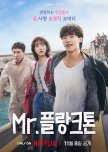
Toxic Leads
I watched this series based on its good ratings and some social media posts describing it as funny. The show does have some poignant moments thanks to its premise -- the male lead had a brutal childhood, which he is still addressing in his late 20s, and his misfortune only gets worse when the story starts -- and the show also has its share of hilarious moments.But...
I absolutely loathed the male and female lead characters. Just hated them, and by the end I did not care if they got some sort of happy ending or not. The male lead, Hae Joo, is immediately shown to be willing to ruin a stranger's wedding out of boredom. Hae Joo decides that was fun, and so next he ruins his ex-girlfriend's (the FL, Jae Mi) wedding by knocking her unconscious and kidnapping her. Once she recovers, he uses every form of manipulation to keep her at his side. It is gross, but I guess we are supposed to see it as funny? Or maybe we are supposed to accept it, because the ML is younger and more handsome than the 2ML? Or maybe we accept it because the ML has some awful misfortune (admittedly his life genuinely does suck)? I don't know. I kept waiting for consequences or redemption or growth from the ML, but he's the same childish mess all the way to the end. This makes the story tougher to swallow.
The FL is almost as bad. She's childish and cringy, showing little development in spite of the demands of the plot. Jae Mi frequently yells and beats on people like she's an idiot. Her treatment of her fiance, the 2ML (Eo), is also gross. Then again, the 2ML is at one point literally portrayed as a whimpering dog... maybe we're supposed to laugh at him? For the FL, the even worse part is her relationship with the ML, which gets to my problem with this series: I think it's celebrating an ugly case of codependency as a "beautiful story."
We're left with two tortured two souls in the leads, which I guess explains the ratings, but the writing doesn't take the characters past wallowing in their own excrement. Further, the whole story is artificially built around the ML -- the ML grabs a love interest who repeatedly overlooks his many flaws, and that leads to a love triangle trope but the ML is so flawed we need a weakling 2ML, plus the story needs supporting characters who cater so extensively to the leads (and the plot) that they might as well be NPCs in a video game. Maybe there is a point about our own selfishness here, which flew completely over my (and everyone else's) head, but absent that, the high point for me is imagining Alan Rickman's voice over and over again, yelling at Hae Joo, "I see you managed to get your shirt off."
Sorry, just not for me. The leads are just too toxic.
Was this review helpful to you?
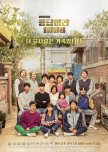
"We didn't have much but our hearts were warm"
I was familiar with the concept of "comfort food" and Reply-1988 is what I would call a "comfort show." We, the viewers, follow five kids (each born in 1971) and their families, starting in 1988. It's an ensemble cast, around 12 characters total, each of whom is a vehicle to explore topics like family, community, youth, aging, and romance. Bad guys are scarce, and they tend to show up for a scene or two, and then disappear. This is a drama about how a family of families support one another.The central character is Deok-sun, the one girl of the five kids. The series is framed as a flashback from the present day, and that framing raises the big question of who does Deok-sun end up marrying. But that's really just the frame, and there's an awful lot of other not-so-romantic issues to address in the story. You'll get a pretty good sense of what to expect from the series in the opening voice-over, which I've headlined with "we didn't have much but our hearts were warm."
Deok-sun herself is a bit different from your standard lead character. She's pretty, yes, but the four guys have been friends with her so long that they barely notice. She struggles as a student, and her college options aren't looking promising. Deok-sun does seem to have a special... social awareness... not sure how to describe it. For example, when her teacher needs someone from the class to take care of a complex problem (no spoilers here), the teacher sagely selects Deok-sun even though Deok-sun's grades aren't so hot and also, frankly, in spite of Deok-sun tendency to act like an idiot in some situations.
That mysterious special-ness of Deok-sun, and similar special-ness of the other main characters, gets to the focus of the show, and why it's rated so highly. The viewer has a nice time, watching these characters help one another and navigate their way to the present day. It is something to emulate.
As for possible complaints, I didn't see not a lot of action in the show, which might turn off some. Again, you can figure out pretty quickly, if that's going to be a problem for you. The only other thing I might complain about would be the weird redactions of the show on Netflix. Apparently there are some questions about property rights, so the editors constantly blurred pop culture imagery -- stuff on the Goldstar TVs, book covers, magazines, wall posters. All the blurring is distracting, and on top of that, folks back in Korea have said all those little pop culture bits enhanced the ambience, so if you can find an unredacted version, then go that route.
Was this review helpful to you?
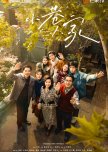
The Chinese Answer to Reply 1988!
"Romance in the Alley" is a slice of life Chinese drama covering two families sharing a courtyard in Suzhou over a 20 year period, roughly 1975 to 1995. It is a time of tremendous change, the economic opening of China, and the environmental strains and opportunities are palpable. This background consistently adds extra twists and turns to the standard family slice of life fare.At the center of the story are Huang Ling and Song Ying, two women at the town's cotton mill, whose families are neighbors in a company apartment complex. Their relationship with each other, their relationships with their husbands, and the relationships among their children form the backbone of the story. The story is at points nostalgic, but it also doesn't back away from the difficulties these people would have faced in this time. Just to be clear, there is some romance here, but romance does not dominate the story.
This being a family drama, filiality and brotherhood/sisterhood are repeated themes. I have compared this show to "Reply 1988" but one significant difference is that there are some obvious recurring villains in this show, which was largely not the case in "Reply 1988." The result is that this show isn't quite as feel-good as "Reply 1988" was, but given the stress of Chinese life in this era, the presence of those kinds of schemers feels more realistic. One other repeated theme is the desire for security, and the fact that the Chinese government's hukou policy makes any plans for the future enormously more complicated. (For those unaware, in China if you live in, say, Suzhou, then you cannot just move to Shanghai or Guangzhou without government permission... and the government is pretty stingy about giving that permission).
On the technical side the acting is generally solid. Ling's marriage is repeatedly tested by her husband's thoroughly filial behavior, and the husband and wife are presented so well that it really is easy to feel the wife's annoyance with this guy. The Song Ying character is a roller coaster ride, starting from the first episode. The child acting is all well-done, and in particular the Dongzhe child actors deliver a hilarious performance. That said, the teenage Dongzhe actor is OK on his own, but feels a bit inconsistent with the others, especially with an accent that doesn't fit the rest of the series. The adult actor for Tunan, Fan Cheng Cheng, has taken some beatings on Chinese social media, but I think that's more a problem in the writing. For whatever reason, the Zhuang Tunan character goes from being a smart, sensible kid to a dork as an adult. More on this in a minute.
Generally the writing was solid, taking an interesting premise of watching two families deal with great social and economic change, and letting it evolve. The conflicts seem to naturally flow, and the resolutions feel true to the characters. There is one problem though, as alluded to in the prior paragraph, the relationship between Zhuang Tunan and Li Jia. The two of them have a potential romance with significant -- and interesting! -- roadblocks, but those roadblocks are addressed awkwardly by the show. The worst happened when Jia locked Tunan into a room together for the night, a strange opportunity to talk out their problems; then the dork (who is in his late 20's at this point) escalated the strangeness by literally jumping out a second floor window as fast as he could, nearly breaking his butt in the process. Basically, a sensible central character was turned into a loon to serve some purpose, I'm not sure what.
Again, there's some interesting stuff here, and aside from the bizarre twists between Tunan and Jia, the series was well-executed. My only other complaint was logistical, that the English translation on YouTube was obviously machine-generated, which could cause confusion without a Chinese speaker around. Some names were frequently translated into English equivalents, which took some time to get used to (for example "Chao Ying" was called "Super English" and "Wu Feng" was translated as "Forest Worker"). Most of the time I could follow what was going on, but the Tunan-Jia scenes got so weird that I assumed I was misunderstanding something.
To summarize, a good story and mostly good characters built off an interesting premise, but prepare for something weird with the Tunan character.
Was this review helpful to you?
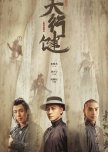
Good enough to watch, wish it had been better
This is an entertaining watch, at times a Chinese variant of spaghetti westerns. When there is a three-way fight and the Good, the Bad, and the Ugly-like theme is playing, the homage is maybe too obvious, but throw it into 1911 China, where the Qing dynasty has less than a yesr left, and you get something distinct. The fight scenes thaf naturally emerge from tbjs premise are well choreographed, and the show manages to avoid getting overly repetitive.The story feels a bit ridiculous at times, these martial arts experts with their blades are unstoppable in 1911. It seems to be partially a point about the Qing dynasty's impending doom, and that these lead characters are doomed regardless of who wins the main battle. Unfortunately that is a strong clue about how the story will end.
The story itself is good, not great. Some of the plot requires that tbe characters suddenly brcome even denser than they had been. The ending also feels rushed and a couple of deaths are not well executed (no pun intended).
The acting is generally good, although the depiction of Zhuo Bufan as a leader of a martial arts gang isn't particularly convincing. He feels more like a reluctant team leader af a mid-sized insurance company.
The show has its own dustinct humor. The constable character, Wang Jialuo, has a comic tendency to start unwinnable fights and then stave off death (plot armor doesn't begin to describe the latter). The ongoing arguments of the Liu Lin character with Lucky and Men Sandao somehow work as effective comic relief.
The soundtrack is a plus -- they really did create a versions of some music from old movie westerns with Chinese twists. The electric guitar laden riffs are also distinct.
In summary, smart and distinct premise, but execution is merely OK with a mostly unhappy ending. I hope someone picks up a similar historical fiction premise, because this could have been better.
Was this review helpful to you?
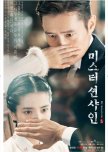
Sweeping Epic
"Mr. Sunshine" is a grand story, taking place in Korea during the 1895-1910 time frame, as the Japanese gradually, and brutally, colonize Korea. We watch as the characters are swept from their old lives into a new, ugly era. It is a heavy story, and (slight spoiler) the ending is true to the that heaviness.What did I like?
The main characters are distinctive with their own internal conflicts. The main character, Eugene Choi, was born in the slave class of Korea; as a child he escaped to the USA, and decades later returned to Korea as an officer in the Marine Corps. Eugene maintains his American identity to the end, but paradoxically falls in love with the aristrocrat-turned-assassin Go Ae Shin. Go Ae Shin is universally respected and cherished, a symbol of what's good in Korea; when she met a boy from a butcher family (a social status similar to Eugene's), that boy, Gu Dong Mae, called her a "spoiled, noble fool", which so haunts her that she eventually joins the anti-Japanese militia. After that encounter Gu Dong Mae had escaped to Japan, where he joins a yakuza-like organization, and then returns to Korea to lead a group of swordsmen who wreak havoc on Korea. Kim Hui Seong also has returned from Japan to his wealthy Korean family, ostensibly to marry his betrothed, Ae Shin, but he struggles with a vague alienation from his social standing. Rounding out the main cast is Kudo Hina, the daughter of a traitorous and powerful Korean official; Hina is a young widow, whose wealthy Japanese husband died under mysterious conditions, leaving Hina enough money to build a large hotel in Hanseong (Seoul).
These characters engage with each other and the contrasts are interesting and entertaining. As their own personal histories become overshadowed by the growing Japanese crisis, for their own reasons they converge, and this convergence (more so than the war itself) is the center of the story. There's some off-beat humor that comes with this convergence (the humor helps to convey the convergence), as these people grow closer even with obvious reasons to not like one another.
The acting is superior. I saw the characters as people. My only concern would be that some of the bad guys were over the top, but the historical record suggests that the actors in some of the villainous roles may have underplayed it a bit.
The cinematography is gorgeous, both inside and out. I have a whole list of locations in South Korea I now want to visit. The production values are high -- obviously I don't know what exactly Hanseong looked like in 1903, but I buy the details that they're presenting.
What did I not like?
The show has action-packed war scenes looming, and yet it's character-driven with gorgeous imagery, which means some folks thought the pace was way too slow. I tend to luxuriate in these scenes, particularly as I need to read the bottom of the screen for the translation of the dialogue, but, yes, the story often drags. Scenes where Eugene and Ai Sin are alone, simply conversing with one another, could be the worst culprits.
In spite of the slow pace and the lengthy close-ups, the character development does have a bit of a hole to it: Why are these three guys so devoted to Ai Sin? She is pretty and passionate and pure of heart, and maybe that's enough. We don't really get significant personal interactions that would show the development of the relationship, and the story felt a bit thin here.
Finally, to reiterate, this is a heavy show. Between episodes, I found myself repeatedly asking "Was it really that bad?" And the answer was generally "Yes, and it's going to get worse." There is no way I could re-watch 35 hours of this any time soon, as entertaining as I thought the series was. In addition to pondering the fates of these characters, I spent so much time thinking about what really happened, and my understanding of the history of that period has gotten darker. Now I need to find some some light-hearted romantic comedy.
Was this review helpful to you?
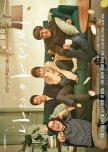
Some shows get you, which makes me happy
I could write a lengthy essay on My Mister, but let's try to boil down to the basics.First, if you are reading this and you haven't watched My Mister (My Ajusshi) yet, then go watch it. The script and the acting are dazzling and the production is first-rate.
Second, if you are reading this and you have watched My Mister, then go watch it again. It's that good, and the show is loaded with so much context, symbolism, coded language, callbacks, double-meanings, etc. that you probably missed a whole lot of stuff the first time around that will yield a very different viewing experience the second time. Maybe spend a little time on social media to prime your next viewing.
The premise is that Park Dong Hoon (Lee Sun Kyun), the ML, is a 43 year-old structural engineer experiencing a mid-life crisis as his marriage, his job, and his brothers' lives are all showing cracks. Lee Ji An (IU) is the FL, a 19 year-old temp worker at the same company as Dong Hoon. While Dong Hoon's life is filled with angst, Ji An's life is simply miserable from crushing poverty and a sadistic loan shark.
You need to know that the series at the outset is grim, but that gloomy environment becomes fuel for the bond that forms between Dong Hoon and Ji An. One important detail of the dreary start is that the central relationship of the series kicks into gear when Ji An steals some money from Dong Hoon. Ji An is a criminal, not just an angel with a dirty face, but downright cold. The writing walks a fine line, not exactly endorsing her actions, but making it clear there's a kind of innocent motivation. Ji An is portrayed as a feral animal, preying on humans for her survival. Again, this is bleak, but from the bleakness emerges something to behold.
The key aspect of My Mister is the ineffable relationship between Dong Hoon and Ji An. It is worth mentioning that the second time through changed how I viewed their connection. The narrative includes so many events depicting Ji An's importance to Dong Hoon, that she almost literally gives him the ability to breathe. OTOH Dong Hoon teaches Ji An what it means to be human. Make no mistake, this is a love story even though there is virtually zero physical intimacy between the two, on screen or off. This develops into a platonic-but-romantic relationship. The romance is not the main focus, as these two are soul mates, who connect in spite of their vast differences, at a time when both desperately needed this connection.
The writing and acting masterfully creates an intense but ambiguous relationship. There is a great reliance on "show not tell." The CEO -- who is unambiguously a weasel -- is used occasionally to state the obvious, but otherwise there are all kinds of clever narrative tricks on display. One such technique is to build other relationships to put mirrors on the main relationship. The most obvious mirror was the pairing between Ki Hoon (Dong Hoon's volatile younger brother) and Ju Ra (an actress who had worked on an unsuccessful movie Ki Hoon directed), where Ju Ra is shown to be playing a character uncannily similar to Ji An. Ju Ra is quirky, and sometimes bubbly, and while I assume this is a joke about the public's perception of IU, Ju Ra's talk about love (and other matters) indirectly shows Ji An's true feelings but does so without impact on the main character's aura.
It is a complex show that works on the most basic level, but maintains its appeal when you dig deeper into the presentation. The craftsmanship in all aspects -- the writing, the acting, the editing, the OST -- is consistently outstanding. This is brilliant television. Again, go watch it.
Was this review helpful to you?
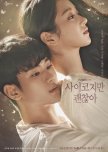
The Courage to Find Happiness
IOTBNO is a character study, heavy on pathos. The premise is that the leads are broken people helping each other heal, and so the leads' mental health is central to the story. As the writer clearly wants to focus on the three leads' psyches, the weakest point in the show has the most physical action.The characters are multi-layered and nuanced, and the actors are effective at presenting their emotions and their inner conflicts. The whole cast is top notch, but the ML (Kim Soo-hyun) and FL (Seo Yea-ji) have incendiary chemistry and the ML's autistic brother (Oh Jung-se) is a fleshed-out human.
The FL writes macabre children's fairy tales, which are used to frame the overall narrative, giving the series a distinctive gothic aesthetic (BTW the FL's books are available for real at Amazon). The show has enough callbacks and symbolism to keep your interest in the details.
Your opinion of the series is likely to be driven by your attitude towards the FL. The FL is arrogant and selfish, and she gets away with outrageous behavior because she is rich and pretty. The series straddles the fences with details on the FL's mental health; the sleaziest character states in the sleaziest way possible that the FL has an antisocial personality disorder (ASPD) while more reliable characters use only vague language to describe her personality. The FL does exhibit some obvious ASPD behaviors (and SYJ, perhaps unreliably, described her character in promo bits as having ASPD) but the FL also shows some empathy early on, and that capacity for empathy grows over time. We are left with a character who literally may or may not be a sociopath, and in the real world that has some consequences that go beyond the depth of this series.
Whatever the case, we are not supposed to be comfortable with the FL. That said, I consider her to be an inspiration in some ways because in spite of her (initial?) toxic behavior, the FL finds the courage to find happiness and furthermore she helps the ML (whose own mental health is a wreck) and his brother develop that same courage. Whether or not they live happily ever after, they have each found a path forward, which seemed impossible at the beginning.
Was this review helpful to you?

Comfortable Watch
I really liked some parts of the show, and there are other parts that were not so good. I split the difference in my rating, but I can see where some will absolutely adore the show and others will be annoyed.On the good side were the characters and their portrayals. The characters have some nuance to them, and the conflicts they face seem real and how they got to their current predicament is relatable. The two leads do not have obvious flaws, which makes it easier to follow along with their story. With one notable exception, the secondary characters have redeeming features as well.
The ML, played by Chen Xing Xu, and the FL, played by Lu Yu Xiao, are likable in part of the acting. It helps that they look good, but again they capture the strengths and vulnerabilities of their characters. The relationships on the show feel like real people going through tough times, particularly the relationships with the FL.
One hook to the show is the virtual reality world where the two leads first meet. It has a gorgeous Republic era aesthetic but the characters do not die in the end, unlike in the Republic era cdramas. Both the leads look fantastic in these VR scenes, which I am guessing helps to explain the ratings here.
Finally, in spite of my issues with the plot, I like the ending. It feels very natural and realistic, avoiding a couple of cheat codes that writers like to use in romance shows. The FL makes her intentions clear, but they still have some navigation ahead.
On the down side, the plot is pedestrian. It never really challenges the viewer and it never moves much beyond standard romantic drama fare. The story goes into vertical drama mode and the reasons don’t make a whole of sense There is some technical stuff that doesn’t seem internally consistent, most notably that it is not clear how the VR world works. Finally, one character just gets worse and worse, until we learn he is basically Satan. That character’s integrity is sacrificed in the end to give the rest of the characters something to fight against, just really unsatisfying if you think to much about it.
In the end, a comfort show with likable and attractive leads, but some details will annoy the heck out of some viewers.
One final note. I have only seen Lu Yu Xiao in one other drama, Romance in the Alley. In that drama she plays a young Shanghai architect in a messy romantic relationship with a colleague while facing family pressures that complicate her love life. It is a supporting role and I kinda feel like Love Between Lines was a continuation of her story. At least in this story her love interest doesn’t jump off the roof when she makes a move.
Was this review helpful to you?

Overall decent, with some interesting cases, but a drop from the prior season
I enjoyed the first season, as the show felt distinct, even if the Shen Yi character at times seems to be a human version of the famed "Enhance!" button trope. The relationship between the two leads was at the heart of that show, and given the way their relationship evolved so dramatically in the first season, it wasn't clear how the relationship would work in a second season.And, honestly, the relationship didn't work. Shen Yi just goes in his own direction, leaving Du Cheng and friends to guess what the heck he is up to. While the acting performances are all solid, the script just breaks the two apart in ways that wouldn't make a lot of sense for people who supposedly take their jobs seriously. As a consequence, some of the resolutions for cases are disappointing, particularly the case with the psychopath girl.
The cases themselves were generally interesting to analyze, although the grand finale is tedious. That's the case where we go even deeper into Shen Yi's head, and by the end I was just annoyed with the star cop of Beijiang, the guy who makes this cop show unique. There is a cliffhanger ending, and I'm not that interested, because while the stand-alone plots generally have been good, the over-arching mythology plot looks maxed-out to me.
Was this review helpful to you?
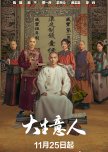
Good drama but some obvious shortcomings
I came away from this show conflicted. On the one hand, the production values and the acting are fabulous. I felt immersed in the world of the later Qing dynasty, with all its quirks. The premise is interesting to me, a scholar exiled to a harsh realm, desperately trying to get back to his hometown so he can make an honest living as a tea farmer, but the corrupt Qing dynasty, some rabid rebels, and various greedy businessmen have other ideas.The show doesn't really fulfill its promise though. Numerous characters become plot devices more than anything else. For example, the mysterious noblewoman Su keeps threatening to have Gu Pingyuan killed, but for some unclear reasons she keeps helping him through some sticky situations. We never really get a resolution for her. The primary antagonist just... kinda... loses interest after his great dark secret is learned. The main character himself becomes... well, a merchant of some sort, I guess, but it's all pretty vague. The dramatic final showdown becomes a couple of secondary characters signing a piece of paper that... I don't know why that piece of paper was so important to them.
You get the picture, I hope. The immersion is entertaining, and there is some dramatic build-up, but the plot peters out at the end. I suppose that's a bit of a rule for late Qing dynasty shows, that you can't really have a clean ending, because the viewer understands everybody in the show is doomed. I am left with an interesting show, but I am not sure what the point was.
So let's give it an 8. The good parts were worth it to me. If you need a story with a compelling ending, then you probably won't be so kind.
Was this review helpful to you?
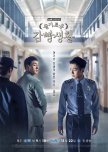
Good But Nits to Pick
I wont go into the gory details here, but I will say the meat of the show -- the way friends support one another -- is worh the watch. Most of the plot does take place in jail or in prison, which puts everyone in that bleak, melancholic state of mind, but the main characters work to overcome their environment, mostly with success and mostly thanks to the good nature of the people around them. It is an inspirational message, and the show did give lots of positive vibes without feeling too preachy or sappy.That alone made it the worth the watch for me, but...
Some of the plot is silly. Villains keep doing their bad deeds to an extent that that defies credibility. The show alternates between cartoon violence for comedic effect and gritty violence to create dramatic tensions, which is a bit jarring. I am also pretty skeptical about the closeness of the relationships between guards and prisoners. It feels a bit shallow, not enough to ruin the story but enough to test our patience.
One odd side note is that the baseball bits are done very well. I know someone really did their research when I hear about Steve Blass. The actor also must have a lot of time and effort into learning how to pitch because he looks pretty good on the mound.
Was this review helpful to you?

This review may contain spoilers
Need to Know a Bit About What to Expect
There is a mild spoiler ahead, but it's from episode 2. I include because if you are thinking of viewing this show, there are three things you should know before you start:1. This is the story of Cha Mi Jo (played by Son Ye Jin) and her two close friends, Jeong Chan Young (Jeon Mi Do) and Jang Joo Hee (Kim Ji Hyun). In episode 2 we learn that Chan Young has a terminal illness and that she will not recover. The rest of the series is devoted to the ways Mi Jo and her friends deal with this awfulness, up to and beyond Chan Young's death. This is a tear jerker.
2. Reiterating something from #1, while this is the story of three friends, Mi Jo is clearly the main character, and Chan Young's passing is largely shown from Mi Jo's perspective. One reviewer suggested that Chan Young's death was a prop in Mi Jo's journey, which is exaggerating, but there is a kernel of truth there. Joo Hee is a third wheel in the friendship, almost from the beginning of the show (and from the beginning of the friendship troika going back 20 years). It shouldn't be too surprising, since in kdrama land Son Ye Jin is royalty, Jeon Mi Do is coming off her breakthrough role with Hospital Playlist (after a long experience on stage), and Kim Ji Hyun is a stage actress without any big kdrama roles before this.
3. Mi Jo gets annoying at times. There were a few times when I wanted to yell at the TV "Your friend is dying, stop nagging her!" It is awkward to have a show focusing on one friend's emotional, and at times irrational, reactions to another friend's impending death.
When thinking about the path to #3, I realized this is where the story starts to get personal, and in a way that's uncomfortable for me (at least). Mi Jo desperately loves her friend, and it is tearing her up inside that her friend will be gone soon. Most people face that position at some point, be it a close friend, a parent, or a spouse. Yes, it's their life, and I want to be supportive, but I will have to deal with the consequences too, and I can guess how bad it will be after this person close to me is gone. I am scared about what might happen if my wife, a cancer survivor, dies.
This story was a lot more challenging than the "happy go-lucky three friends find love and meaning as they approach their 40th birthdays" tale that I expected. That would be my summary of the series, solid story, good acting, just not what I was expecting. My only real complaint would be the adoption story lines, which were not exactly "bad" but felt barely relevant to the main story. Again, a good series, as long as you know what you are getting into.
Was this review helpful to you?
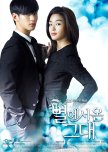
Love comes most cruelly to those who do not believe in it
The premise of this series is that an alien from another planet has been quietly living as a Korean with minimal social connections for 400 years. Three months before his return to his planet, he is working as a young college professor in Seoul, when the hottest TV star in Korea moves into the luxury apartment next door. She is arrogant, ignorant, and vain, but (perhaps because he has no idea who she is) she also shows her vulnerable side to him. Further, with his super sensitive ears he clearly hears her talk of her unhappy life and then he has premonitions that she is in danger and in need of protection. By the third episode, despite his best efforts to maintain his solitude, she has taken over his life.If I haven't lost you by this point, you will probably enjoy this show. There is a sci-fi component here, but much of that is seen through the eyes of a kdrama diva, often to comedic effect. Mainly the ML character (Do Min Joon) hops onto the FL character's (Cheon Song Yi) roller coaster, and we get to watch the ride. The writer has built a character in Song Yi -- lonely and vulnerable, but with an inexhaustible reservoir of ego and self-confidence -- that makes the romance with a reluctant super powered alien seem downright logical.
The series occasionally brought out my inner Roger Ebert to ding it in a review, but it is too much fun to be harsh. The many iconic moments -- the ending on the red carpet, the kissing problems, him literally sweeping her off her feet, his rigid lifestyle giving way to whatever she needs, the "You are my destiny" anthem -- make the story epic no matter its smaller faults.
Beyond the romance that leads the story, we have a memorable psychotic character who murders anyone who even thinks about getting in his way. We also have a handsome rich guy who desperately tries to ward off our male lead, but so good-natured that Min Joon enlists his help to care for Song Yi. There's also some social commentary about Korea's unhealthy habits with regard to celebrities and status.
So, yes, the writing at times seems to be filling-out a 16 episode story into 21 episodes with overdoses of flashbacks and double scenes, and the acting and staging occasionally feel dated, I guess? I also had questions about what actually is happening, especially between Min Joon and the girl he met 400 years before. But if you know what you're getting into, you'll likely enjoy the story.
For the sake of reference, this show was written by the same person who wrote Crash Landing on You. There are some obvious similarities between this series and CLOY. If you are looking for something like CLOY, then MLFAS is a kind of CLOY precursor that you might enjoy.
Was this review helpful to you?


